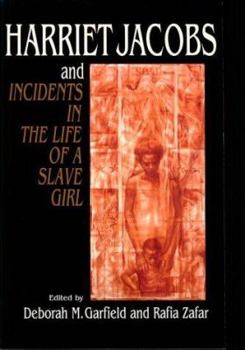Harriet Jacobs and Incidents in the Life of a Slave Girl: New Critical Essays
(Part of the Cambridge Studies in American Literature and Culture Series)
Select Format
Select Condition 
Book Overview
Harriet Jacobs, today perhaps the single most read and studied Black American woman of the nineteenth century, has not until recently enjoyed sustained, scholarly analysis. This anthology presents a far-ranging compendium of literary and cultural scholarship that will take its place as the primary resource for students and teachers of Incidents in the Life of a Slave Girl. The contributors include both established Jacobs scholars and emerging critics;...
Format:Paperback
Language:English
ISBN:0521497795
ISBN13:9780521497794
Release Date:February 1996
Publisher:Cambridge University Press
Length:320 Pages
Weight:1.00 lbs.
Dimensions:0.8" x 5.9" x 8.9"
Customer Reviews
2 ratings
How dear is your freedom?
Published by Thriftbooks.com User , 18 years ago
This was a great read. The author takes us back to her innocent and fairly comfortable childhood and then surveys her own life. Her family is painted with bright brushes, you get to know them as they are beaten, whipped, run away, or die. The amount of indignity man heaps on his fellow human beings is almost too much, but Harriet's clarity helps you to understand the motivation of most of the players. Harriet's Journal clearly depicts just how the barbarism of slavery not only destroys the lives of the slaves, but of the slave owners. Harriet manages to get free, but at what a cost! This book is a real page turner. I could not put it down.
Rare first hand account of slavery
Published by Thriftbooks.com User , 18 years ago
Harriet Jacobs book Life of a Slave Girl is a unique piece of slave literature directly from the pen of an articulate slave. One gets a sense of the poignant way she can retell the story of her enslavement from a passage she writes in the preface of her book. ". . . I do earnestly desire to arouse the women of the North to a realizing sense of the condition of two millions of women at the South, still in bondage, suffering what I suffered, and most of them far worse. I want to add my testimony to that of abler pens to convince the people of the Free States what Slavery really is. Only by experience can any one realize how deep, and dark, and foul is that pit of abominations." Her story raises emotions of sentiment for a mother struggling to hold her family together, and it shines a light on the cruelties of slavery. The political sentiment at the time among the elites in the northern states was increasingly becoming antislavery. The political aspect of Jacob's writing is not that of the highly stylized writings of famous abolitionists or of eminent blacks such as Frederick Douglass using reason and religion to condemn slavery. Jacob's writing is visceral and down to earth. Her powerful argument against slavery pulls at the heartstrings of any sympathetic decent human being. In essence, Jacob's story is one that resonates with people of all socio-economic backgrounds. It is no mystery why the hearts and minds of people are stirred to action after one reads Jacob's disturbing accounts of sexual depravity, mental anguish, and the destruction of the family unit, that she endured as a slave. Her first person narrative account is what makes her book such a strong force of political sentiment in the genre of slave narrative. Since there were so few slave narratives in circulation at the time, it was easy for Jacob's book to engender such strong political sentimentality. Jacob's ability to arouse aesthetic sentimentality in her audience was a bit tricky, because of the sexual decisions she had to make in her life. Deciding to have an elicit sexual relationship with an unmarried white neighbor to escape the depraved advances of her owner could be construed as Jacob's being more interested in autonomy and less interested in chastity. Jacob has made it clear to her audience that it was her station in life that caused her to make what her white readers would consider an unconventional choice. Jacob's plight as a slave caused her to choose freedom over trying to protect her chastity more strenuously. Since slavery took away almost all of her freedom and individuality, she was willing to trade her chastity for the freedom of choice. Jacob's virginity was one of the few things she possessed that she was able to withhold from her owner. After going into detail for why she made her choice she still felt it was necessary to apologize to her "Victoria" audience for her decision. This act on her part was truly one of the





